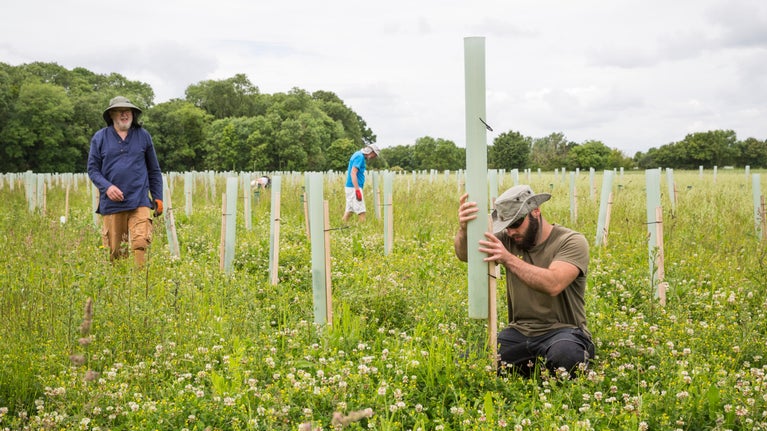
Tackling climate change
Uncover how we’re responding to the changing climate at places in our care.

Like every organisation and home, the National Trust depends on energy. However we remain committed to an overall reduction in our usage and generating more of ours from renewable sources, to help protect the environment and allow us to spend more on conserving properties, countryside and wildlife. Here’s a selection of top tips to help you likewise reduce your energy costs at home, and what better time to start than now.
It’s tempting and convenient to leave appliances on standby, but with the number of gadgets that we now all have at home, each small bit of needless electricity use can soon add up. A typical family home could cut their bill by an average of £147 a year, according to a 2022 British Gas report, by making sure everything is off when not needed, rather than left on standby.
More than half of your energy bills at home come from heating and providing hot water. If you have a hot water tank, insulate it with a jacket, which should only cost about £30 but could save you a lot more over the coming years.
Most of us won’t notice this small drop in temperature at home, but it will typically save us around £80 a year off our heating bills so is well worth it in the long run.

These now come in all shapes and sizes and are bright enough to replace halogen bulbs. Replacing all the light bulbs in a typical family house would cost around £100, but will save around £35 a year in electricity. LEDs will also generally last for at least five years, so are smarter option long-term.
If you haven’t already, reduce heat loss from your home by insulating the loft (current recommendation is for 270mm of loft insulation for mineral wool insulation, other materials might require different depths) and reducing draughts at doors and windows with draught strips, and by using thick thermal-lined curtains. You'll notice an instant change in temperature and won't need the heating on so high or so often.
Reduce water and energy usage by fitting an Eco showerhead, which uses less water while you shower, so less water to be heated in the first place – a double win. (it's worth noting that these aren't suitable with power showers.)

Remember to periodically bleed your radiators. It's recommended you do this once a year at the start of the heating season to help make sure your boiler is delivering heat into each room most efficiently.
When cooking, use saucepan lids to keep the heat in the pan and don’t be tempted to keep opening the oven door unnecessarily, as it can take several minutes to get back up to the previous temperature each time, as well as extending the cooking time.

Uncover how we’re responding to the changing climate at places in our care.
Climate change is the single biggest threat to the places we care for. Take a look at our environmental pledges as we adapt, reduce carbon emissions and address the damage already done.

Discover how some of the special places in our care are harnessing the power of the sun to generate electricity and reduce their carbon footprints.

The climate crisis can be overwhelming, but small actions can help make big changes. Find out how you can play your part with ideas from planting trees to going peat-free.

Find out more about the National Trust's role in the Greener UK coalition.
